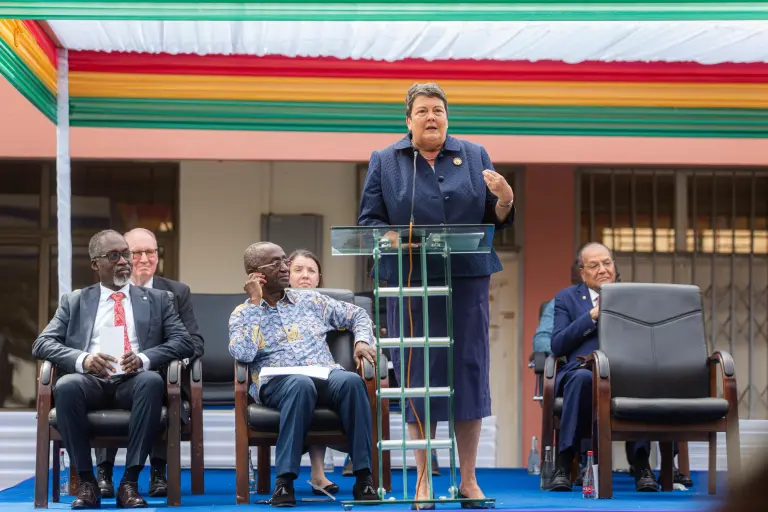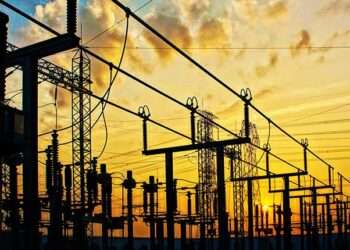The United States Embassy has inaugurated a state-of-the-art simulator training centre at the School of Nuclear and Allied Sciences (SNAS) in Accra, marking a significant milestone in Ghana’s nuclear power development journey.
The facility, named the E2 Centre, is the first of its kind in Sub-Saharan Africa and aims to position Ghana as a regional hub for nuclear energy expertise while advancing sustainable energy solutions across the continent.
At the launch event, Virginia E. Palmer, the United States Ambassador to Ghana, highlighted the centre’s significance as a foundational step in Ghana’s journey toward adopting nuclear energy.
She expressed optimism about the far-reaching impact of the facility, which she said would not only create jobs but also drive economic growth and enhance industrial capabilities in Ghana and the broader African region.
“The E2 Centre represents a bold step toward diversifying energy sources and embracing clean, sustainable solutions.
“The United States is proud to partner with Ghana on this nuclear energy journey, a partnership rooted in mutual benefit, knowledge sharing, and long-term commitment.”
Virginia E. Palmer, the United States Ambassador to Ghana
The E2 Centre is equipped with cutting-edge computer modelling technology that replicates a NuScale 12-module Small Modular Reactor (SMR) control room.
Designed as a regional training hub, the centre will equip professionals with the skills and expertise required for the safe and secure use of nuclear power.
At the core of the E2 Centre is the NuScale Small Modular Reactor (SMR) technology. SMRs are widely recognized as a cutting-edge innovation in nuclear energy, offering a safer, scalable, and cost-effective alternative to traditional reactors.
Ambassador Palmer emphasized the advantages of SMRs, explaining that they provide flexibility in deployment and significantly reduce the risks associated with conventional nuclear power plants.
“By investing in nuclear technology, we are contributing to a cleaner, more sustainable future.
“The SMR’s innovative design ensures not only operational safety but also economic viability, making it a game-changer for Ghana and Africa.”
Virginia E. Palmer, the United States Ambassador to Ghana
The integration of SMR technology aligns with Ghana’s ambitions to diversify its energy mix, reduce reliance on fossil fuels, and address the continent’s growing energy demands sustainably.
The technology’s modular design and cost efficiency also make it an ideal solution for nations transitioning toward low-carbon energy systems.
Partnerships Driving Innovation and Development

The establishment of the E2 Centre is a collaborative effort supported by the Foundational Infrastructure for Responsible Use of Small Modular Reactor Technology (FIRST) capacity-building programme.
In partnership with the International Science and Technology Centre and NuScale Power, the initiative aims to build capacity for the responsible adoption of nuclear energy technologies in developing countries.
Patrick Nomo, Chief Director of the Ministry of Environment, Science and Technology, commended the partnership between Ghana and the United States, emphasizing the role of the E2 Centre in advancing the country’s energy ambitions.
“This facility places Ghana at the forefront of nuclear energy development in Africa.
“It is a testament to our commitment to adopting innovative solutions to address our energy challenges.”
Patrick Nomo, Chief Director of the Ministry of Environment, Science and Technology
The launch event brought together dignitaries from the Ghana Atomic Energy Commission (GAEC), academia, the energy sector, and government institutions, reflecting the broad stakeholder support for Ghana’s nuclear energy aspirations.
The inauguration of the E2 Centre represents a critical step in Ghana’s nuclear energy development, paving the way for future projects and partnerships.
With its focus on training, innovation, and capacity building, the facility is expected to serve as a catalyst for sustainable energy leadership in Africa.
The support from the US Embassy and international organizations highlights the growing recognition of Ghana’s potential to lead in the adoption of clean and innovative energy solutions.
The E2 Centre’s emphasis on safety, scalability, and collaboration sets a strong foundation for the country’s nuclear energy ambitions.
The initiative not only strengthens Ghana’s position as a leader in sustainable energy but also serves as a model for other nations in Sub-Saharan Africa seeking to embrace advanced energy technologies.
READ ALSO: Auditor-General Uncovers Overdue Fees and Overpayment at Universities





















